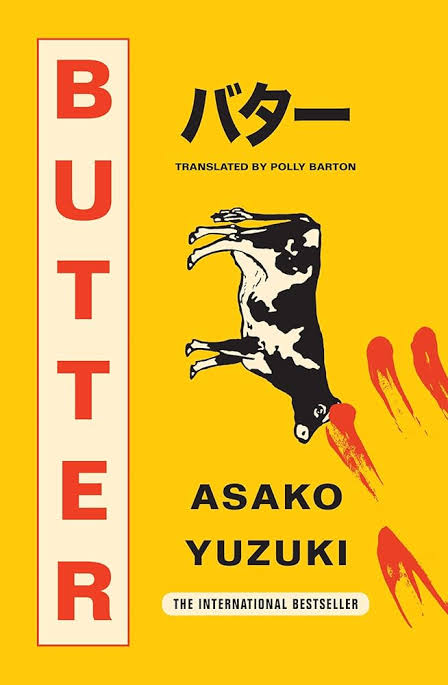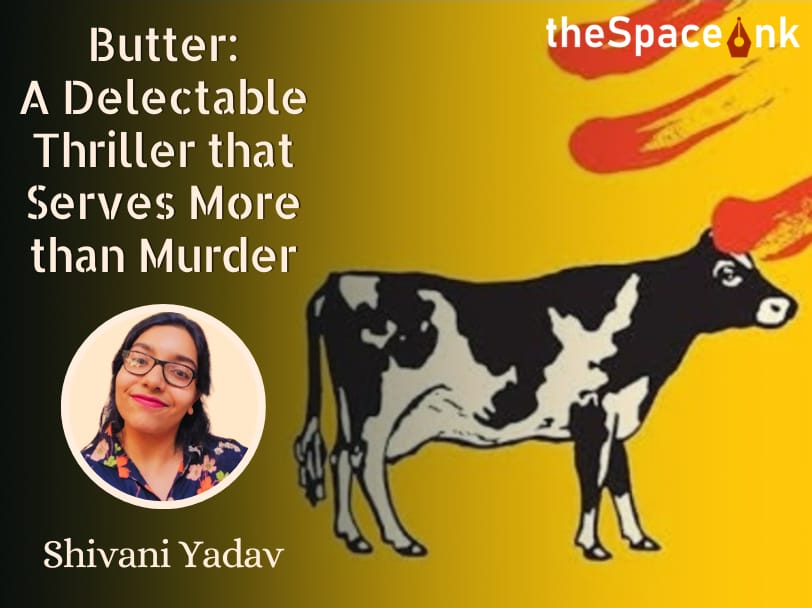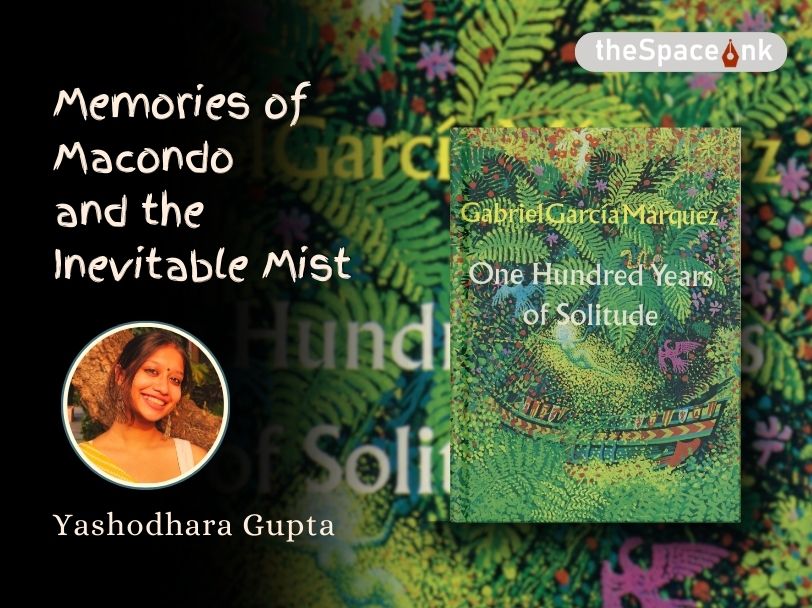Title: Butter
Author: Asako Yuzuki, Translated by Polly Barton
Language: English
Publisher: 4th Estate, London
No. of Pages: 452
Format: Paperback
Price: INR 599
* * * * *
Picking up the Japanese bestseller Butter, I expected the novel to take me on a fun ‘inside the mind of a serial killer’ ride with a side of mouth-watering descriptions of food. And while I did get that, the novel took me off guard by being much richer in its themes.
The writer, Asako Yuzuki wasn’t interested in writing a simple thriller about a female serial killer, Manako Kajii who has been convicted of killing several of her male romantic companions. Instead, as one continues on with the narrative, Yuzuki bombards the reader with an analysis of modern-day Japan and how its capitalist structures have shaped sexism in that society and the impossible beauty standards women have to contend with on a regular basis.

Our protagonist, Rika Machida is a Tokyo-based journalist, working for the newspaper Shūmei Weekly. In an effort to nab an interview with Kajii, Rika, on the suggestion of her friend Reiko, writes to Kajii asking for her recipe for beef stew (the dish that Kajii allegedly killed her victims with).
This starts a conversation between the two, where Kajii refuses to discuss her case, but instead demands Rika to eat certain dishes and share her experience of eating that dish with her. As Rika complies with Kajii’s culinary demands, she finds herself physically and mentally changing and so begins a murky journey of a weird friendship that eventually pushes the reader to question whether a murder can happen without any clear violence taking place.
Fatphobia & Beauty Standards
Butter tackles many issues in its narrative. Conversations surrounding weight and eating habits dominate the novel. Kajii is an overweight woman – by Japanese standards – but refuses to live by those standards and that in turn has turned her into an object of critique in Japanese society. Similarly, when Rika starts unabashedly indulging in food and begins to gain weight, everyone around her becomes vocally “concerned”.
Japan’s stringent social standards for beauty are treated head-on with these weight fluctuations.
And while the novel’s treatment of this topic can easily be considered as non-problematic, I couldn’t help but wonder whether it’ll be a difficult, or downright triggering read for a person dealing with an eating disorder.
Nevertheless, the representation of fatphobia among Rika’s peers and the general public were pretty bang-on. The reactions she elicits from the people around her on her weight gain is something everyone who is not thin can easily relate to, regardless of which culture they belong to.
A Tribute to the Japanese cuisine
Considering that the book has been marketed as a thriller, people might be surprised to find out that much of the narrative is filled with long descriptions of preparation of food and the experience of consuming it. While that strays from the conventions of thriller writing, they are necessary additions to the book because they showcase Rika’s sensory experience of the cuisine and how what she’s eating is impacting her on a molecular level.
Be it a quatre-quarts cake made with equal parts butter, sugar, flour and eggs, or be it ramen consumed with loads of butter in the middle of the night and immediately after having sex, the descriptions of different dishes are so delicious that by the end, one can’t help but find themselves craving for Japanese food. Yuzuki has, without a doubt, written a wonderful tribute to Japan’s cuisine without being in-your-face about it.
Character Depth
Every good novel makes efforts to analyze their primary characters by laying them bare for the readers enough to come to their own conclusions about the morality of the characters. In Butter, Yuzuki doesn’t shy away from the challenge and pays each character, no matter how small their role is, the respect they deserve. Each character, particularly Rika, Reiko and Kajii, experience a full character arc that points to their growth (or in Kajii’s case, the lack thereof).
Also Read: When The Word Is Made Flesh: A Review of Kannanari’s Chronicle of an Hour and a Half
But the most interesting aspect of the book was bringing character depth by showcasing their individual eating habits that were informed by their upbringing. Rika’s traumatic relationship with her father, Reiko’s estrangement from her parents, and Kajii’s uncomfortably close relationship with her father, all define how they look at food, what they choose to eat and how. These complex relationships with their families also shape the level of conservatism they inhabit in their view towards the world.
From living with past traumas to seeing a possibly lonely future ahead and preparing for that, Yuzuki beautifully weaves the contours of modern-day Tokyo, and particularly shows how the millennial generation looks at the world around them.
Homoeroticism
One interesting aspect of the book that took me by surprise was the subtle thread of queerness running throughout the book between Rika and Reiko, whose even names feel like different versions of a single word. There are constant mentions of Rika’s “boyish handsome” looks, and how she was considered a prince in high school.
Their friendship seems perfectly normal on the surface, but there’s an obsession both of them have towards each other’s life (especially Reiko towards Rika), that masks itself as normal concern, but tends to cross general boundaries.
Reading those scenes certainly makes one question the true intentions of the characters. Although, eventually, after going through a roller-coaster of events that included Reiko suffering a minor mental breakdown because of Kajii, and fluctuation of Rika’s weight which in turn changes how people look and treat her, we find Rika wanting to go back to “becoming Reiko’s prince”.
Is Rika and Reiko’s relationship simply an obsessive female friendship or was there an underlying attraction between the two which the pressures of the conservative Japanese society prevent them from exploring? I guess, that’s up for individual interpretation.
Symbolism of Butter
As expected, butter plays a huge role throughout the book, shown wonderfully before one even opens the book by the fantastic cover design by Emma Pidsley.

Even the main quote from the book – made by the serial killer herself – that has been swimming around the internet is related to butter – “But there are two things I simply cannot tolerate: feminists and margarine.”
Butter holds the power of enhancing every dish, according to Kajii. So, every time Rika consumes a dish on the orders of Kajii, she finds herself going through an experience that borders of orgasmic. The sensory experience the dishes have on Rika, are enhanced by the presence of butter, the presence of which is emphasized by Kajii.
So, Rika’s each meeting with Kajii and the subsequent culinary task she performs, finds her changing her perspective about the alleged serial killer and questioning whether she even murdered her victims. This gradual change in mind was fascinating to read.
However, it is important to note that in Japan, butter is largely seen as a symbol of Western influence leading to the birth of the phrase “bata-kusai” (meaning “butter-smelling”) which is used to describe something overly Westernized. Having said that, while still retaining its Western connotations, in modern-day Japan, with the development of domestic butter production, butter has also come to represent a degree of Japanese self-sufficiency, allowing it to also symbolize a level of Japanese culinary independence.
The presence of loads of butter in each dish, according to Kajii, can point towards her independent nature that doesn’t believe in following any societal standard in regard to her gender, despite having conservative views on gender roles.
Similarly, Rika’s understanding of herself and the people around her gradually changes towards a more emotionally independent route as she starts cooking and consuming food with butter as an enhancing ingredient.
For Yuzuki, in the novel, butter plays multiple roles. Where on one hand, it can act as a subtle representation of someone’s character, on the other hand, it can act as a tool that helps a character grow emotionally and intellectually.
Just like how Rika’s object of fascination Kajii plays with her mind, telling her one thing at once and then contradicting it at another moment, the book too plays with the expectations of its reader. Just like how Rika goes in to meet Kajii with her pre-conceived notions and is greeted with everything but what she expects, the readers too will find themselves surprised with the narrative if they got in expecting the novel to be a straight-forward, salacious thriller.
In actuality, Butter is a rich, delectable, character-driven, psychological thriller that will leave the reader (quite literally) hungry for more.
Image Courtesy: Amazon, Wysokie Obcasy
Shivani Yadav is a literary translator and popculture writer. Her work has appeared in literary journals, Kitaab and The Antonym, along with online websites like Firstpost, Bound India, Kunzum, LiveWire, and Feminism In India. She’s currently studying to become a Counselling Psychologist. You can find her on Instagram (@TheShivaniYadav) and read her popculture newsletter on Substack.









3 Responses
What an insightful review. Wonderfully penned. I am so intrigued about this book now.
Haven’t explored such an interesting theme before. Thanks Shivani. Look forward to reading more reviews by you!
An awesome review by Miss Shivani Yadav is in total appreciation of the very differently themed novel by this young author Asako Yuzuki for her out of box thinking as a novelist!!!
We expect more from Asako!
Very insightful review! I love how the themes of the book are so simply unraveled and how respectfully you’ve regarded the Japanese culture, doing justice to the socio-cultural sphere the women in Japan must experience and connected it to a wider audience. The thoughtful consideration of themes and their impact on the viewers, such as with eatings disorders is very much appreciated and seen. Wonderful review, makes me want to read this book ASAP!